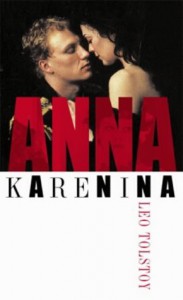Review: ‘Anna Karenina’ by Leo Tolstoy
Married to a powerful government minister, Anna Karenina is a beautiful woman who falls deeply in love with a wealthy army officer, the elegant Count Vronsky. Desperate to find truth and meaning in her life, she rashly defies the conventions of Russian society and leaves her husband and son to live with her lover. Condemned and ostracized by her peers and prone to fits of jealousy that alienate Vronsky, Anna finds herself unable to escape an increasingly hopeless situation. Set against this tragic affair is the story of Konstantin Levin, a melancholy landowner whom Tolstoy based largely on himself. While Anna looks for happiness through love, Levin embarks on his own search for spiritual fulfillment through marriage, family, and hard work. Surrounding these two central plot threads are dozens of characters whom Tolstoy seamlessly weaves together, creating a breathtaking tapestry of nineteenth-century Russian society. (Goodreads Summary)
This book was my first foray into Russian literature, and I could not have had a better introduction. Tolstoy has a way of phrasing the thoughts and feelings of the characters that is so insightful, precise and identifiable that it easily transcends the innumerable differences between a modern reader and the selection of people he focuses on living in nineteenth century Russia. They are all incredibly psychologically developed and I felt as if I knew them all personally and could predict how they might react in any given situation. Tolstoy also colours his narrative so that it is seen through the eyes of the different characters, giving the reader many different viewpoints from which to perceive events and settings and so making the novel very rich. A scene from the perspective of Oblonsky, for example, is light, frivolous and faintly cynical, whereas the same situation seen through Levin’s eyes is thoughtful and earnest.
Unfortunately, while the human drama of the novel has stood the test of time admirably, much of Tolstoy’s social commentary has not fared so well. The sections on social economy, agriculture and political systems may have ben fascinating to a contemporary Russian reader but I found them lengthy, tedious, unnecessary and, dare I say it, dull. However, I’m more than willing to ignore the effect of these passages in light of the sheer brilliance of the rest of the book.
This particular translation (Penguin, 1954, this edition 2000) by Rosemary Edmonds is fantastic. Her prose is readable and appropriate, so that the book does not read like translated literature at all, but like any other nineteenth century novel. The illusion was so well-executed that the only time I was made aware that I wasn’t reading original language literature was when characters discussed which pronouns to use to refer to one another, an aspect of language which is absent from modern English. Both the translation and the original writing make this a thoroughly excellent book.
Anna Karenina by Leo Tolstoy, translated from the Russian by Rosemary Edmonds. Published by Penguin, 2005, 853. Originally published in 1873.
N.B. This is an old review written in 2010 and posted on Goodreads and LibraryThing before I started keeping track of all the books I read here at Old English Rose Reads. I’ve decided to keep copies here so that this remains a complete record of my reading since I started reviewing books for my own pleasure.
